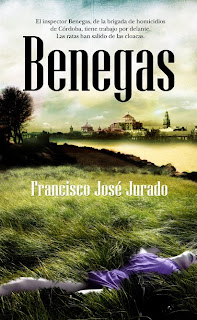Francisco José Jurado Cordoba is a writer with a long literary career crowned with numerous awards and citations, especially in the context of the story. "Benegas is his first novel, published by Almuzara, and the name of the protagonist of this book promises to become saga: the Chief Inspector of Judicial Homicide Brigade of Cordoba, hometown of the author. A novel that has reaped rewards and praise from critics and audiences, highlighting having been a finalist for the award of Brigade 21 and Novelpol novel. The dream debut for any novelist.

The novel consists of three different stories, three seemingly separate plots where peculiar Benegas and team have to put all eggs in one basket to resolve the investigation. But nothing is as it seems and the apparent irrelevance of the three stories will result in one of the most amazing end to which we may find ourselves not only on gender and black, but the narrative in general.
In the first of the stories Benegas and his aides are investigating the death of a important politician who was involved in shady business, rooted with dark goings that occurred in the early Franco Cordoba, once ended the Civil War: The Falange, church, social institutions and the business of buying and selling of gold is mixed in a case much more complicated than it seems.
The second story appears another major stigmas in today's society: child pornography and prostitution degrading treatment in high-flying. A million dollar business in which they are involved middling celebrities and academics, in a network in which unscrupulous blackmail, corruption and murder can be a bargaining chip for either player in such a dangerous world.
But by the third and final story, "Who killed Frankie Jury?" when the author, with that unmistakable nod to his own name in the title of the plot, gives an unexpected twist to the reader, sucking helplessly into a whirlpool in which we do not know what is fiction and what is reality. It all starts with the disappearance of a young black writer who practiced literary, selling his soul to the devil and his work, in this case in the hands of a mediocre scribbler of three to room full of conceit, that because of the checks signed by father, nobleman known banker and Cordoba with friends in high places, get make a name thanks to the works of "ghost writer" and tinkering between savings and cultural institutions in awarding literary prizes in the region.
Francisco José Jurado, heir to the best crime novel Mediterranean (the author confesses fan Vázquez Montalbán, Márkaris or Montalbano, although sources Mankell drinks) presents a Benegas something away from the usual canons of police novel . And perhaps most important difference is normal. A man in the street, of his time, working, cynical observer of life you live. An inspector with a nose that does not believe in tricks to find those guilty of crimes, but only in a job well done. A man like any other, in love with his wife to the core but is going through the doldrums of marriage that can happen to anyone. A policeman knows as little of the environment in which it moves, the low and high Córdoba funds this beautiful and ancient that weekend tourists know they exist.
special mention of the great side of these stories, both the research team Benegas as different characters that appear in the detective plot. Realistic characters who live, laugh, cry and roam the city, knowing of his hand the typical bars in the area, the most important monuments or institutions that govern the city with a firm hand. With a few dialogues accurate, something acidic in certain circumstances, Benegas and his crew are putting us squarely in their research while advancing the plot, talking football, women, heads unbearable or anything else of which we could hear in our daily lives while enjoying a few beers tapas to forget the hard day's work.
The author makes a risky bet both in substance and in form. In the exercise of more canonical novels, re-creating the society in which the characters move, the novel eviscerates us unequivocally dirtiest rags that others know Córdoba: political corruption and other social institutions, influence peddling, urban plots, dirty business at the mercy of the enrichment of stores, high-flying prostitution in the most exclusive areas of the city, online blackmail, exploitation of fellows in the University, Church and its many arms executing the business of the purchase of literary awards, the shenanigans between banks, savings banks and their social and political work shifts, etc.. This book leaves no puppet head in a provincial town where everyone knows each other, transforming the city into a character in the plot.
But what really surprised the reader is mirrors game that takes place in the last part of this exciting novel. So far the work developed in the third person omniscient so classic. But in the last stage the events are occurring at a rapid pace, narrated in first person by someone telling us what's happening in real time. Frankie jury found that the writer is hired as black and Benegas becomes the main character of his novels sold at the behest of substantial checks to obviate their responsibility. The inspector and his assistants Benegas pass real life, as the reader and writer become literary characters. Intricate will seduce the reader, leading to unimaginable paths in which fiction and reality collide to result in a powerful end that leaves you breathless.
A particularly well-written novel, with an elegant style and story line crescendo, leaving the best for last. In short, a work worthy of note in these days when the Anglo-Saxon or Scandinavian crime novels is in fashion, demonstrating that the police protagonists in the works of the great masters of southern Europe may have a worthy successor in this Benegas which will be own literary saga.
0 comments:
Post a Comment